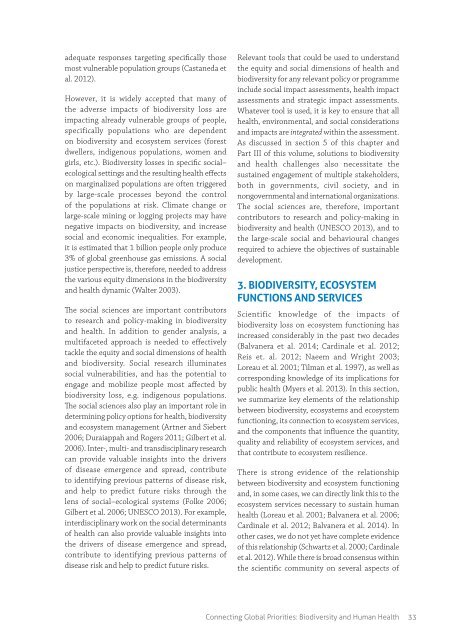Connecting Global Priorities Biodiversity and Human Health
1ZcgwtN
1ZcgwtN
You also want an ePaper? Increase the reach of your titles
YUMPU automatically turns print PDFs into web optimized ePapers that Google loves.
adequate responses targeting specifically those<br />
most vulnerable population groups (Castaneda et<br />
al. 2012).<br />
However, it is widely accepted that many of<br />
the adverse impacts of biodiversity loss are<br />
impacting already vulnerable groups of people,<br />
specifically populations who are dependent<br />
on biodiversity <strong>and</strong> ecosystem services (forest<br />
dwellers, indigenous populations, women <strong>and</strong><br />
girls, etc.). <strong>Biodiversity</strong> losses in specific social–<br />
ecological settings <strong>and</strong> the resulting health effects<br />
on marginalized populations are often triggered<br />
by large-scale processes beyond the control<br />
of the populations at risk. Climate change or<br />
large-scale mining or logging projects may have<br />
negative impacts on biodiversity, <strong>and</strong> increase<br />
social <strong>and</strong> economic inequalities. For example,<br />
it is estimated that 1 billion people only produce<br />
3% of global greenhouse gas emissions. A social<br />
justice perspective is, therefore, needed to address<br />
the various equity dimensions in the biodiversity<br />
<strong>and</strong> health dynamic (Walter 2003).<br />
The social sciences are important contributors<br />
to research <strong>and</strong> policy-making in biodiversity<br />
<strong>and</strong> health. In addition to gender analysis, a<br />
multifaceted approach is needed to effectively<br />
tackle the equity <strong>and</strong> social dimensions of health<br />
<strong>and</strong> biodiversity. Social research illuminates<br />
social vulnerabilities, <strong>and</strong> has the potential to<br />
engage <strong>and</strong> mobilize people most affected by<br />
biodiversity loss, e.g. indigenous populations.<br />
The social sciences also play an important role in<br />
determining policy options for health, biodiversity<br />
<strong>and</strong> ecosystem management (Artner <strong>and</strong> Siebert<br />
2006; Duraiappah <strong>and</strong> Rogers 2011; Gilbert et al.<br />
2006). Inter-, multi- <strong>and</strong> transdisciplinary research<br />
can provide valuable insights into the drivers<br />
of disease emergence <strong>and</strong> spread, contribute<br />
to identifying previous patterns of disease risk,<br />
<strong>and</strong> help to predict future risks through the<br />
lens of social–ecological systems (Folke 2006;<br />
Gilbert et al. 2006; UNESCO 2013). For example,<br />
interdisciplinary work on the social determinants<br />
of health can also provide valuable insights into<br />
the drivers of disease emergence <strong>and</strong> spread,<br />
contribute to identifying previous patterns of<br />
disease risk <strong>and</strong> help to predict future risks.<br />
Relevant tools that could be used to underst<strong>and</strong><br />
the equity <strong>and</strong> social dimensions of health <strong>and</strong><br />
biodiversity for any relevant policy or programme<br />
include social impact assessments, health impact<br />
assessments <strong>and</strong> strategic impact assessments.<br />
Whatever tool is used, it is key to ensure that all<br />
health, environmental, <strong>and</strong> social considerations<br />
<strong>and</strong> impacts are integrated within the assessment.<br />
As discussed in section 5 of this chapter <strong>and</strong><br />
Part III of this volume, solutions to biodiversity<br />
<strong>and</strong> health challenges also necessitate the<br />
sustained engagement of multiple stakeholders,<br />
both in governments, civil society, <strong>and</strong> in<br />
nongovernmental <strong>and</strong> international organizations.<br />
The social sciences are, therefore, important<br />
contributors to research <strong>and</strong> policy-making in<br />
biodiversity <strong>and</strong> health (UNESCO 2013), <strong>and</strong> to<br />
the large-scale social <strong>and</strong> behavioural changes<br />
required to achieve the objectives of sustainable<br />
development.<br />
3. BIODIVERSITY, ECOSYSTEM<br />
FUNCTIONS AND SERVICES<br />
Scientific knowledge of the impacts of<br />
biodiversity loss on ecosystem functioning has<br />
increased considerably in the past two decades<br />
(Balvanera et al. 2014; Cardinale et al. 2012;<br />
Reis et. al. 2012; Naeem <strong>and</strong> Wright 2003;<br />
Loreau et al. 2001; Tilman et al. 1997), as well as<br />
corresponding knowledge of its implications for<br />
public health (Myers et al. 2013). In this section,<br />
we summarize key elements of the relationship<br />
between biodiversity, ecosystems <strong>and</strong> ecosystem<br />
functioning, its connection to ecosystem services,<br />
<strong>and</strong> the components that influence the quantity,<br />
quality <strong>and</strong> reliability of ecosystem services, <strong>and</strong><br />
that contribute to ecosystem resilience.<br />
There is strong evidence of the relationship<br />
between biodiversity <strong>and</strong> ecosystem functioning<br />
<strong>and</strong>, in some cases, we can directly link this to the<br />
ecosystem services necessary to sustain human<br />
health (Loreau et al. 2001; Balvanera et al. 2006;<br />
Cardinale et al. 2012; Balvanera et al. 2014). In<br />
other cases, we do not yet have complete evidence<br />
of this relationship (Schwartz et al. 2000; Cardinale<br />
et al. 2012). While there is broad consensus within<br />
the scientific community on several aspects of<br />
<strong>Connecting</strong> <strong>Global</strong> <strong>Priorities</strong>: <strong>Biodiversity</strong> <strong>and</strong> <strong>Human</strong> <strong>Health</strong><br />
33


